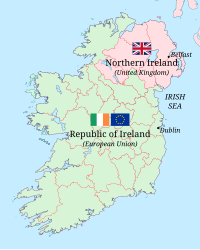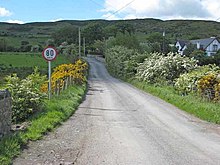
Back البريكست والحدود الأيرلندية Arabic Brexit et frontière irlandaise French Brexit dan perbatasan Irlandia ID Confine irlandese dopo l'uscita del Regno Unito dall'Unione europea Italian
| Part of a series of articles on |
| Brexit |
|---|
 |
|
Withdrawal of the United Kingdom from the European Union Glossary of terms |


The impact of Brexit on the Irish border and its adjacent polities involves changes in trade, customs, immigration checks, local economies, services, recognition of qualifications, medical cooperation, and other matters, as it is the only land border between the United Kingdom and the European Union.[a]
After the UK Parliament voted to leave the European Union, all parties said that they want to avoid a hard border in Ireland, due particularly to the border's historically sensitive nature. Border issues were one of three areas of focused negotiation in the Withdrawal Agreement. Following the United Kingdom's exit from the European Union on 31 January 2020, this border is also the frontier between the EU and an external country. The Northern Ireland Protocol of the Brexit withdrawal agreement commits the UK and the EU to maintaining an open border in Ireland, so that (in many respects) the de facto frontier is the Irish Sea border between the two islands. This requires the continued application of the Common Travel Area as well as free trade of goods (including electricity) between Ireland and Northern Ireland. The latter requires the UK to follow EU law in Northern Ireland with respect to these areas, with jurisdiction of the European Court of Justice in the interpretation of the law.
Cite error: There are <ref group=lower-alpha> tags or {{efn}} templates on this page, but the references will not show without a {{reflist|group=lower-alpha}} template or {{notelist}} template (see the help page).